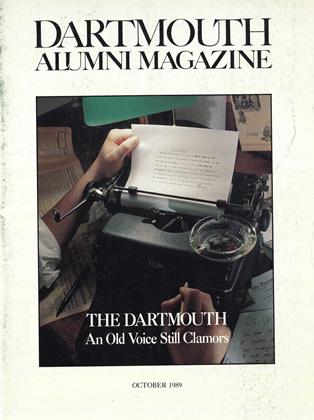In late summer, when Michael Reynolds turned in his story to us, we greeted him with our usual, "Hey, Michael, what's happening?" Being editor of The Dartmouth, he took our question seriously and came back with some vignettes from around campus. We couldn't help adding a few ourselves. Ed.
After two terms on Mount Olympus negotiating delayed rush and freshman exclusion, Henry Todd '90 opted for a working vacation on the desert plains of Africa. The energetic and socially facile president of the Coed Fraternity Sorority Council spent the summer in the office of Kenya's Commissioner of Refugees.
Can you imagine mallet-wielding Dartmouth jocks gracefully nudging wooden balls through wickets? Better known for its hard-core brethren on the lacrosse and football fields, Theta Delta Chi fraternity grooms some serious croquet champions. The brothers hold an annual match on their lawn.
Although President James O. Freedman takes a lot of flak from students who don't think he's visible enough around Hanover, you can frequently find him at noon, browsing the Dartmouth Bookstore. The president maintains a 4,500-volume indexed library of hardcover classics and personal favorites. Especially prized: the first book he ever bought Sinclair Lewis's Atrowsmith, Modern Library edition.
Charles T. Wood, the Daniel Webster Professor of History, recently described part of his current scholarship as research on the gynecology of the Virgin Mary. Steeped in medieval legal, intellectual, and cultural history, Wood is curious about the religious claim that Mary entered the world without the stain of original sin, colloquially known as the "Curse of Eve" or menstruation. Wood reasons, "IfMary were without original sin, she should not have been subject to menstruation, and, therefore, should not have been fertile." Wood joins thinkers such as St. Thomas Aquinas who spent years pondering Maiy's gynecology.
"Ancient novel" may sound like a contradiction in terms, but Classics Professor James Tatum sees the works of ancient Greece and Rome as the ancestors of the stuff of Joyce and Nabokov. Last July Tatum organized a major conference on the subject at Dartmouth, attracting 133 classicists, literary scholars, and historians from around the world. At least one paper shows that even the earliest novels had bestseller potential. The work was titled, "Two Thousand Years of Erotic Fantasy."
Favorite places for students to eat at 2:00 a.m.: Harry's Truck Stop and Dunkin Donuts. Harry's has strong coffee, and its trucker clientele make you feel almost normal about being awake at an ungodly hour.
Twenty-one members of the United States Ski Team's alpine division wrestled with German during ten days in the College's intense All Language Programs (ALPS) associated with John Rassias. The Dartmouth professor created the programs to provide the "essentials for sustenance" how to deal with numbers, talk about yourself, give directions, obtain food. In order to grasp the dominant language of international skiing, the participants agreed to speak German exclusively during their stay at the College. One 1988 Olympian said he enjoyed Dartmouth's environment so much that he plans to apply for admission: "I'm definitely coming if I get in." Added to the spoken tongues taught at ALPS this summer was a silent one: American Sign Language.
Dartmouth is patenting more inventions than ever before, with ten pending this year. Only 15 patents were awarded between 1950 and 1978.
Students say one of the best courses of the summer was "Earth, Moon and Planet," taught by Astronomy Professor Robert Jastrow. His slide presentations were said to be terrific, and the classroom, Spaulding Auditorium, is air-conditioned.
As this was being written, Dartmouth was advertising for positions requiring unusual skills. Among the jobs available: one-quarter of a stringquartet-in-residence, a "tumor registrar," and a sleep-disorder technician.
 View Full Issue
View Full Issue
More From This Issue
-
 Feature
FeatureBoredom's Uses
October 1989 By Joseph Brodsky -
 Cover Story
Cover StoryDon't Call It "The D"
October 1989 By Michael T. Reynolds '90 -
 Feature
FeatureAfter the Massacre
October 1989 By Jessica Smith '89 -
 Feature
FeatureHow I Started Writing Muscular Prose
October 1989 By Chuck Young '88 -
 Feature
FeatureBUBBLE AND PEAK
October 1989 -
 Article
ArticleDR. WHEELOCK'S JOURNAL
October 1989
Article
-
 Article
ArticleMasthead
January 1945 -
 Article
ArticleMountaineering Journal
APRIL 1969 -
 Article
ArticleReginald Williams '76 Named Cincinnati City Councilman
SEPTEMBER 1988 -
 Article
ArticleA New Front on Robinson’s Back
JANUARY 1997 -
 Article
ArticlePRESIDENTIAL SEARCH
November 1968 By CHRIS KERN '69 -
 Article
ArticleRequired Reading A Moral Book
APRIL 1998 By John Rassias '49A


